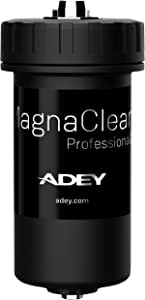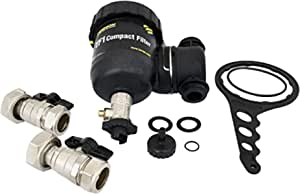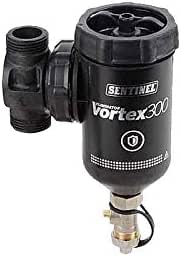Magnetic boiler filters have gained significant popularity in the boiler and central heating industry in recent times. If you own a central heating system, it’s essential to grasp the concept, function, and cost of these filters.
The Necessity of a Boiler Magnetic Filter
Yes, a boiler magnetic filter is indeed essential. Sludge buildup in a home’s heating system is a common problem that can create issues if not addressed. To prevent this, installing a magnetic filter can be a smart investment that helps keep energy and repair bills low over time. It plays a crucial role in preserving the efficiency and durability of a boiler system.
The best magnetic filters on the market include:
The primary function of a magnetic filter is to trap and remove unwanted debris, including sludge, dirt, and metallic particles, from the circulating water in the heating system.
By preventing the accumulation of these contaminants, a magnetic filter reduces the risk of blockages, enhances heat transfer, and improves the overall performance of the boiler. Regularly cleaning and maintaining the magnetic filter can significantly extend the lifespan of the boiler, reduce energy consumption, and minimize the need for costly repairs.
The filter, along with an inhibitor, works to remove dirt, debris, and sludge from the heating system, all of which can impede the water flow and potentially damage the boiler. With the installation of a filter, the performance and longevity of the boiler are significantly improved.

Understanding the Boiler Filter
A boiler system filter, also known as a magnetic filter or central heating filter, is fitted to the boiler’s return pipework to capture debris and magnetite from the water in the central heating system. This is crucial to keep your boiler system clean and prevent issues caused by magnetite, which is dissolved metal present in the water of a heating system.
Magnetite is often a result of electrolysis and poor installation of a heating system, and it can lead to metal deposits, appearing as black sludge in radiator water, especially in the lower part of heating systems. The magnetic filter’s purpose is to catch this debris, thus keeping the boiler system water clean.
The Advantages of a Magnetic Filter Installation
Installing a boiler system filter offers numerous benefits, including:
1. Longer Boiler Lifespan
Modern boilers have become more compact, making the waterways smaller and more susceptible to damage from debris and sludge. A magnetic filter prevents these particles from reaching the boiler, reducing the chances of breakdowns and part failures.
2. Lower Energy Bills
With the removal of debris and magnetite, the boiler system operates with less strain, requiring less fuel to provide heat, ultimately leading to reduced gas bills.
3. Environmentally Friendly
A more efficient boiler system consumes less gas, resulting in lower carbon dioxide emissions, making it better for the environment.
4. Extended Warranties
Many companies offer longer warranties when a magnetic filter is installed by an accredited professional. This can extend the warranty by up to 5 years, providing added peace of mind.
Boiler Magnetic Filter Costs
Most magnetic filters cost less than £100 to purchase, with some pricier options offering advantages like easy installation in awkward spaces and better water flow to retain more rust. The total cost of installing a filter in an existing system is around £150, which includes the filter and labor, but it can vary depending on the type of filter used.
The Installation Process of the Magnetic Filter
The installation process of a magnetic filter involves the following steps:
- Draining the heating system of water.
- Measuring the height for installation on the return pipe and marking the section.
- Removing the marked pipe section.
- Securing the valve nuts and olives to the filter’s open pipe connections.
- Fitting the filter onto the secured nuts and tightening.
- Adding a chemical dosing solution for further system protection.
- Re-pressurizing the heating system and checking for correct operation.
Where to Install the Magnetic Filter
Magnetic filters yield the best results when installed on the return pipe of a central heating system, close to the boiler, after the last radiator. However, if space or access is limited, anywhere after that radiator will work to capture the maximum amount of metal deposits.
The magnetic filter should be installed with adequate access for future servicing and cleaning.
Adding a Filter to an Old Boiler System
While magnetic filters are typically installed during the boiler’s initial installation, they can also be added later. For boilers under 7 years old, installing a filter can be especially beneficial, particularly if they are still under warranty.
However, on older systems, debris might be dislodged during the installation process, requiring the system to be fully drained before fitting the filter. The decision to add a filter should consider the cost versus the potential savings in terms of boiler lifespan and preventing part faults.
Cleaning the Magnetic Filter
Cleaning the magnetic filter is essential for maintaining its efficiency. Follow these steps for effective cleaning:
- Turn off the electrical supply to the boiler and close any isolation valves to the filter. Place a dust sheet underneath.
- Loosen the air vent at the top of the filter to release any pressure inside.
- Remove the lid of the filter.
- Slide out the magnet and filter from inside the casing. Only the filter needs cleaning.
- Clean the filter outside, preferably using a pressure hose to remove rust.
- Put the magnet and filter back into the casing and retighten the lid securely using a spanner.
- Turn the electrical supply back on and reopen the isolation valves.
- Check for any leaks coming from the filter lid.
Boiler Filter Replacement
Magnetic filters can last for several years due to their lack of moving parts. Most filters have a minimum warranty period of two years, but some high-end filters come with warranties up to 10 years, which can often match the boiler’s lifetime.
In conclusion, installing a boiler magnetic filter is a necessary step to enhance the efficiency and lifespan of your boiler system while enjoying lower energy bills and contributing to a more environmentally friendly operation. With a variety of filter options available, finding the best one for your central heating system is achievable, and regular maintenance will ensure it performs optimally for years to come.
Boiler magnetic filter cost
Most magnetic filters cost less than £100 to buy with the more expensive ones allowing you to fit them in awkward spaces and pipe directions. They also slow down water to help retain more rust Installing one to an existing system can cost around £150 including the filter and labour but depends on the type used.
Best Magnetic Filters for Central Heating Systems
For UK residents seeking the best magnetic filter for their central heating system, several options are available:
Disclosure: Some of the links below are Amazon affiliate links. This means that, at no cost to you, we may earn an affiliate commission if you click through the link and complete a purchase.
1. Adey MagnaClean Professional2
The Adey MagnaClean Professional2 is highly efficient, removing up to 100% of magnetite and other debris from the central heating system. It boasts a simple twist and lock mechanism for easy installation and maintenance and is compatible with a wide range of boilers and heating systems. The filter comes with a two-year warranty for added peace of mind.
For UK residents looking for the best magnetic filter for their central heating system, there are several options available. One of the best options is the Adey MagnaClean Professional2. This filter is highly efficient and can remove up to 100% of magnetite and other debris from the central heating system. It is also easy to install and maintain, with a simple twist and lock mechanism that allows for quick cleaning of the filter.

The Adey MagnaClean Professional2 is also compatible with a wide range of boilers and heating systems, making it a versatile choice for homeowners. Additionally, it comes with a two-year warranty for added peace of mind. Overall, it is an excellent choice if you’re looking for a high-quality magnetic filter for their central heating system.

2. Fernox TF1 Compact Filter
The Fernox TF1 Compact Filter is designed to remove all types of debris, including magnetite, rust, and sludge, from central heating systems. It offers easy installation and servicing and can be installed in any orientation. The filter comes with a 25-year warranty.
Fernox TF1 Compact Filter: This magnetic filter is designed to remove all types of debris from central heating systems, including magnetite, rust, and sludge. It has a unique design that allows for easy installation and servicing, and it can be installed in any orientation. The Fernox TF1 Omega Filter also comes with a 25-year warranty for added peace of mind.
3. Sentinel Eliminator Vortex300 Filter
The Sentinel Eliminator Vortex300 Filter is another option for removing debris from central heating systems effectively. It has a compact design for easy installation and servicing and comes with a 10-year warranty.

Sentinel Eliminator Vortex300 Filter: This magnetic filter is designed to remove all types of debris from central heating systems, including magnetite, rust, and sludge. It has a compact design that allows for easy installation and servicing, and it can be installed in any orientation. The Sentinel Eliminator Vortex300 Filter also comes with a 10-year warranty for added peace of mind.
How often should a filter be cleaned out?
You should clean the magnetic system filter out at least once a year and is best done during the boiler servicing. Most filters have the capacity of one year’s worth of debris on average. But, if the filter was installed on an old system, you may have to clean it more often for the first few months.
